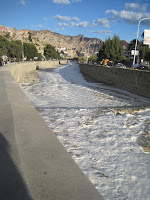 |
| Rio Choqueyapu |
Bolivia has just passed a very encouraging – and groundbreaking – law of protection for Mother Earth, or Pachamama, the earth goddess and creator of all in the indigenous Aymara tradition. Now lawsuits can be brought claiming damages to Pachamama. The awareness is there, but the budget is not sufficient to the task, and enforcement will be hard to obtain. For instance, there are no laws in Bolivia against dumping trash on land or water. Just below our home is a dirty river called Choqueyapu, which is officially dead. Apparently 200,000 gallons of urine are dumped into it annually, along with 160,000 tons of excrement and tons of toxic waste from factories. The stench is overwhelming as we walk to the bus stop beside its foamy chocolate-colored waters. There are no leash laws and dog excrement is a part of sidewalk life, which adds to the runoff. We saw some laughing girls leaving an automotive business with a huge bucket which they dumped into the rushing waters without a care.
There are few private cars in La Paz, but many private minibuses which traverse the city constantly. This reduces smog and traffic though the buses themselves create major traffic jams and their emission controls are minimal. Littering is ubiquitous.
 |
| Not Pachamama, but another indigenous masked figure |
On the other hand, the carbon footprint of most Bolivianos is tiny. Imagine the impact of not using any heat between March and December, of course no air conditioning, no hot tap water and just a little electric heater for shower water. No clothes dryers, hardly any plane travel and few cars. Bolivians are acutely aware of the climate changes that have taken place in recent years, as they have lost 30% of their glaciers in the last 20 years, according to a Quaker environmental conference we attended.
So it appears that in most parts of the world the pollution is right under our feet, whereas in the so- called developed world, we create our pollution miles away from where we live, in our coal mines, our jet streams and our meat factories.
No comments:
Post a Comment